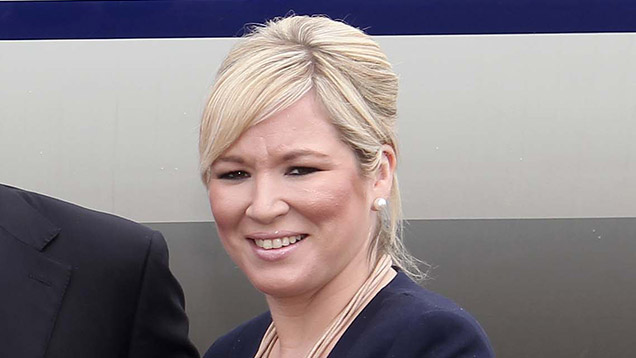Dairy farmers to hold crisis talks at Stormont
 Michelle O'Neill (c) Rex
Michelle O'Neill (c) Rex The crisis gripping the dairy farming industry is the focus of crucial talks to be held at Stormont.
Dairy farmers, farming union representatives and ministers will gather at Stormont, the home of the Northern Ireland Assembly, on Thursday (30 July).
Speaking ahead of the talks, Northern Ireland’s agriculture minister Michelle O’Neill called on Europe to find ways to raise milk prices for farmers to prevent a collapse in the dairy sector.
See also: Hogan concedes to ‘serious difficulties’ in dairying
Ms O’Neill warned that more dairy farmers would go out of business unless they received higher prices for their milk.
Currently, farmers in Northern Ireland are being paid 19p/litre on average for their milk, but it costs about 27p/litre to break even.
The minister told the BBC that the European Commission must raise the milk intervention price – which is about 21 cents (15p/litre) – a system at which surplus dairy commodities are bought by the EU when prices are low.
“What we need to see is intervention at a European level, particularly in relation to price intervention that would allow the market to bottom out, which would allow us then to start to build again,” Ms O’Neill told the BBC.
“Phil Hogan can continue to live in an ivory tower if he wishes but this is a global problem. It’s not just a problem for farmers in Northern Ireland, it’s a problem right across the board on a European level.”
The Ulster Farmers’ Union (UFU) has welcomed the recall of the Assembly’s agriculture and rural development committee and said cross-party support from politicians could help build a case for action by the European Commission.
UFU president Ian Marshall said dairy farmers were caught in a “perfect storm” of problems as a result of currency, the Russian import ban on western products, a global oversupply of dairy products and economic problems in China.
“With milk prices where they are no farmer can make a margin – and those who have invested to modernise and grow their businesses are in the worst position of all,” he added.
“With no signs of global recovery this year, things will get worse as we go into the autumn and winter, when costs begin to rise for farmers. This is why it is not an exaggeration to describe this as a crisis.”
